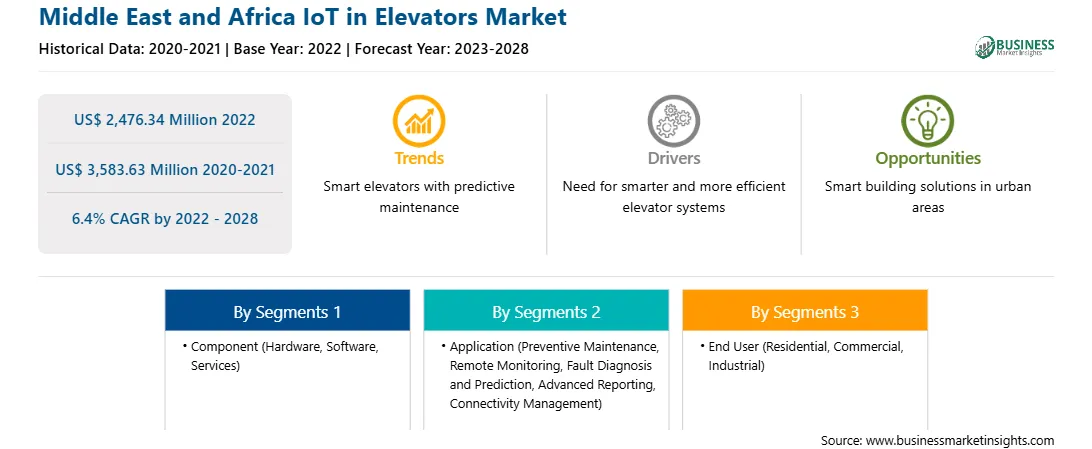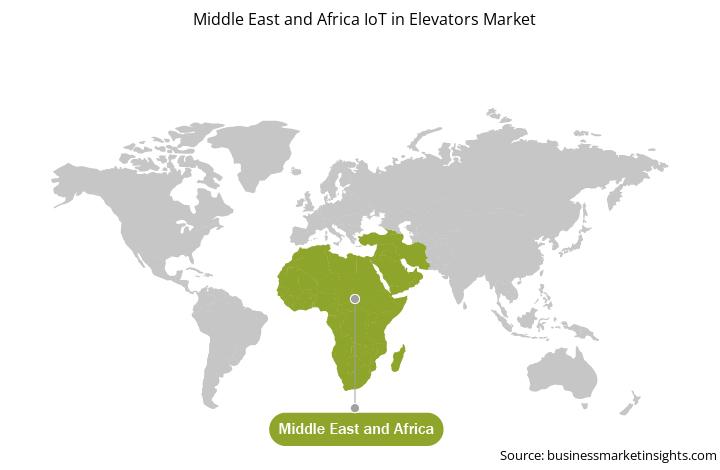The Middle East & Africa IoT in elevators market is expected to grow from US$ 2,476.34 million in 2022 to US$ 3,583.63 million by 2028; it is estimated to grow at a CAGR of 6.4% from 2022 to 2028.
Furthermore, several players in the current market landscape are increasingly devoting resources to developing smarter elevators, resulting in the development of innovative IoT solutions. For instance, Liftinzicht develops IoT-enabled smart apps to reduce maintenance costs; the company created a Minimum Viable Product (MVP) using PHP and low-level databases and launched the Lift manager elevator app. Lift manager app consists of features, such as the app collecting data from QR codes on elevators, making it easier for elevator managers on the go to enter registrations by simply opening their phones. In addition, to transform the application from a registration tool to a complete management tool, graphs and other business process intelligence such as alerts, emails, digests, and notifications on important events were added. The cutting-edge software anticipates when maintenance is required. The company has determined that elevators do not require as much maintenance as they did previously based on usage data. Smart cities access information and communication technologies (ICTs) in many aspects, including the economy, environment, mobility, health, living, and governance, to promote long-term economic development and high life quality to address growing urbanization challenges. The smart city mission's main goal is to boost economic growth and improve people's lifestyle by using many technologies, such as the IoT and AI that lead to smarter outcomes. Thus, many developing and developed governments are significantly investing in developing smart cities. For instance, with Saudi Arabia Vision 2030, the Saudi Authority planned to start the smart city project in 10 cities, including Makkah, Riyadh, Jeddah, AI-Madinah, and AI-Ahsa. On January 10, 2022, Crown Prince and Chairman of the NEOM Company announced THE LINE AT NEOM, in which the government is investing US$ 500 million to build 170km smart cities. The smart city is a linear development of hyper-connected AI-enabled communities powered by 100% clean energy. The government launched the 'Smart Dubai 2022 Strategy'. The objective of the strategy includes a smart, livable, and resilient city, leveraging ICT innovations, an interconnected society with easily accessible social services, and smooth transport driven by autonomous and shared mobility solutions. In addition, a clean environment is enabled by cutting-edge ICT innovations, and digital, lean, and connected government are the other objectives. Dubai Plan 2022 aims to transform the city into a smart and sustainable one. The Smart City project in Dubai follows a strategy that can transform ~1,000 government services into six key areas—transportation, infrastructure, communications, financial services, urban planning, and electricity. Government initiatives are positively impacting the development of smart cities, which would create lucrative opportunities for the IoT in elevators market growth during the forecast period.
With new features and technologies, vendors can attract new customers and expand their footprints in emerging markets. This factor is likely to drive the Middle East & Africa IoT in elevators market growth at a notable CAGR during the forecast period.
Strategic insights for the Middle East and Africa IoT in Elevators provides data-driven analysis of the industry landscape, including current trends, key players, and regional nuances. These insights offer actionable recommendations, enabling readers to differentiate themselves from competitors by identifying untapped segments or developing unique value propositions. Leveraging data analytics, these insights help industry players anticipate the market shifts, whether investors, manufacturers, or other stakeholders. A future-oriented perspective is essential, helping stakeholders anticipate market shifts and position themselves for long-term success in this dynamic region. Ultimately, effective strategic insights empower readers to make informed decisions that drive profitability and achieve their business objectives within the market. The geographic scope of the Middle East and Africa IoT in Elevators refers to the specific areas in which a business operates and competes. Understanding local distinctions, such as diverse consumer preferences (e.g., demand for specific plug types or battery backup durations), varying economic conditions, and regulatory environments, is crucial for tailoring strategies to specific markets. Businesses can expand their reach by identifying underserved areas or adapting their offerings to meet local demands. A clear market focus allows for more effective resource allocation, targeted marketing campaigns, and better positioning against local competitors, ultimately driving growth in those targeted areas.
Middle East and Africa IoT in Elevators Strategic Insights

Middle East and Africa IoT in Elevators Report Scope
Report Attribute
Details
Market size in 2022
US$ 2,476.34 Million
Market Size by 2028
US$ 3,583.63 Million
Global CAGR (2022 - 2028)
6.4%
Historical Data
2020-2021
Forecast period
2023-2028
Segments Covered
By Component
By Application
By End User
Regions and Countries Covered
Middle East and Africa
Market leaders and key company profiles
Middle East and Africa IoT in Elevators Regional Insights

Middle East & Africa IoT in Elevators Market Segmentation
The Middle East & Africa IoT in elevators market is segmented into component, application, end user, and country. Based on component, the market is segmented into hardware, software, and services. Based on application, the Middle East & Africa IoT in elevators market is segmented into preventive maintenance, remote monitoring, fault diagnosis and prediction, advanced reporting, and connectivity management. Based on end user, the Middle East & Africa IoT in elevators market is categorized into residential, commercial, and industrial. Based on country, the Middle East & Africa IoT in elevators market is segmented into South Africa, Saudi Arabia, the UAE, and the Rest of Middle East & Africa.
Middle East & Africa IoT in Elevators Market — Companies Mentioned
Hitachi, Ltd.; Mitsubishi Electric Corporation; Otis Worldwide Corporation; HYUNDAIELEVATOR CO., LTD.; Robert Bosch GmbH; and Schneider Electric SE are a few major companies operating in the Middle East & Africa IoT in elevators market.
The Middle East and Africa IoT in Elevators Market is valued at US$ 2,476.34 Million in 2022, it is projected to reach US$ 3,583.63 Million by 2028.
As per our report Middle East and Africa IoT in Elevators Market, the market size is valued at US$ 2,476.34 Million in 2022, projecting it to reach US$ 3,583.63 Million by 2028. This translates to a CAGR of approximately 6.4% during the forecast period.
The Middle East and Africa IoT in Elevators Market report typically cover these key segments-
The historic period, base year, and forecast period can vary slightly depending on the specific market research report. However, for the Middle East and Africa IoT in Elevators Market report:
The Middle East and Africa IoT in Elevators Market is populated by several key players, each contributing to its growth and innovation. Some of the major players include:
The Middle East and Africa IoT in Elevators Market report is valuable for diverse stakeholders, including:
Essentially, anyone involved in or considering involvement in the Middle East and Africa IoT in Elevators Market value chain can benefit from the information contained in a comprehensive market report.